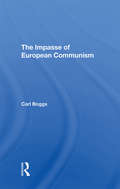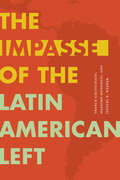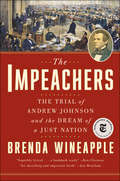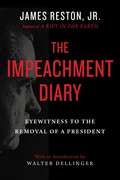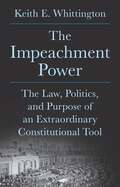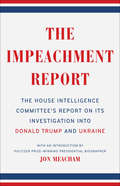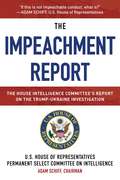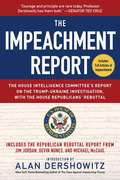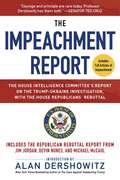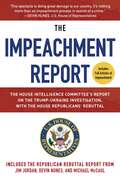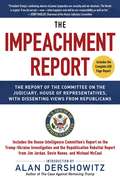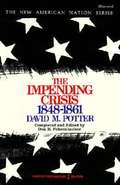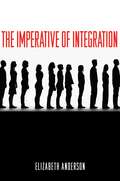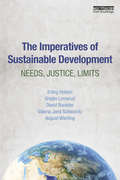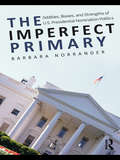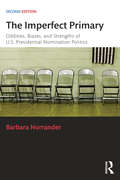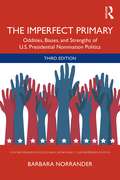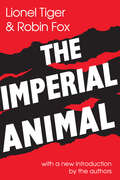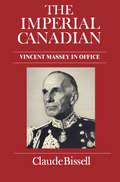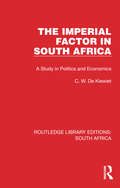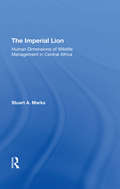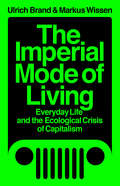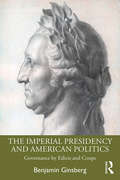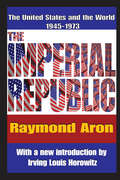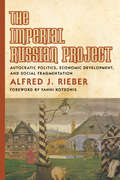- Table View
- List View
The Impasse Of European Communism
by Carl BoggsThe major Communist parties in Western Europe claim a commitment to a "democratic road to socialism." Often this is a genuine evolution of traditional Marxist/Leninist ideology based on the assumption that political and economic power can be obtained through gradual change rather than revolution and through the utilization of democratic processes. How well is this strategy working? Not very well, concludes the author of this book. Carl Boggs bases his analysis on a theoretical assessment of the historical and strategic development of Eurocommunism — of those par ties and movements (notably in France, Italy, and Spain) that seek a transition to socialism based on the democratization of existing political and economic structures (the so-called parliamentary road to socialism). After examining the logic and premises of this conception, he moves to a critique of the major Eurocommunist theoreticians—e. g., Togliatti, Berlinguer, Ingrao, Napolitano, Carrillo, Marchais, Elleinstein, Poulantzas, and Claudin. He concludes that their ideas fail to resolve the historic Marxist conflict between democratization and rationalization (understood here in terms of the drive toward statism, bureaucratization, and further refinement of the social division of labor under capitalism). In fact, says Dr. Boggs, Eurocommunism will probably represent a sort of historical resolution of legitimation and production crises within Mediterranean capitalism that extends rather than overturns hierarchical social and authority relations, the capitalist state, and the social division of labor. Such a resolution might broadly parallel the function of social democracy in Northern Europe in a previous phase of capitalist development.
The Impasse of the Latin American Left (Radical Américas)
by Jeffery R. Webber Massimo Modonesi Franck GaudichaudIn The Impasse of the Latin American Left, Franck Gaudichaud, Massimo Modonesi, and Jeffery R. Webber explore the region’s Pink Tide as a political, economic, and cultural phenomenon. At the turn of the twenty-first century, Latin American politics experienced an upsurge in progressive movements, as popular uprisings for land and autonomy led to the election of left and center-left governments across Latin America. These progressive parties institutionalized social movements and established forms of state capitalism that sought to redistribute resources and challenge neoliberalism. Yet, as the authors demonstrate, these governments failed to transform the underlying class structures of their societies or challenge the imperial strategies of the United States and China. Now, as the Pink Tide has largely receded, the authors offer a portrait of this watershed period in Latin American history in order to evaluate the successes and failures of the left and to offer a clear-eyed account of the conditions that allowed for a right-wing resurgence.
The Impeachers: The Trial of Andrew Johnson and the Dream of a Just Nation
by Brenda Wineapple“This absorbing and important book recounts the titanic struggle over the implications of the Civil War amid the impeachment of a defiant and temperamentally erratic American president.”—Jon Meacham, Pulitzer Prize–winning author of The Soul of America When Abraham Lincoln was assassinated and Vice-President Andrew Johnson became “the Accidental President,” it was a dangerous time in America. Congress was divided over how the Union should be reunited: when and how the secessionist South should regain full status, whether former Confederates should be punished, and when and whether black men should be given the vote. Devastated by war and resorting to violence, many white Southerners hoped to restore a pre–Civil War society, if without slavery, and the pugnacious Andrew Johnson seemed to share their goals. With the unchecked power of executive orders, Johnson ignored Congress, pardoned rebel leaders, promoted white supremacy, opposed civil rights, and called Reconstruction unnecessary. It fell to Congress to stop the American president who acted like a king. With profound insights and making use of extensive research, Brenda Wineapple dramatically evokes this pivotal period in American history, when the country was rocked by the first-ever impeachment of a sitting American president. And she brings to vivid life the extraordinary characters who brought that impeachment forward: the willful Johnson and his retinue of advocates—including complicated men like Secretary of State William Seward—as well as the equally complicated visionaries committed to justice and equality for all, like Thaddeus Stevens, Charles Sumner, Frederick Douglass, and Ulysses S. Grant. Theirs was a last-ditch, patriotic, and Constitutional effort to render the goals of the Civil War into reality and to make the Union free, fair, and whole.Advance praise for The Impeachers “In this superbly lyrical work, Brenda Wineapple has plugged a glaring hole in our historical memory through her vivid and sweeping portrayal of President Andrew Johnson’s 1868 impeachment. She serves up not simply food for thought but a veritable feast of observations on that most trying decision for a democracy: whether to oust a sitting president. Teeming with fiery passions and unforgettable characters, The Impeachers will be devoured by contemporary readers seeking enlightenment on this issue. . . . A landmark study.”—Ron Chernow, Pulitzer Prize–winning author of Grant
The Impeachment Diary: Eyewitness to the Removal of a President
by James RestonThis eyewitness account of the impeachment process against Richard Nixon holds lessons for our own time. James Reston, Jr., took leave from teaching during the summer of 1973 to witness the Senate Watergate Committee hearings as he worked with his coauthor on what became the first full-length book to advocate for Richard Nixon's impeachment. During the following summer, he returned to Washington, DC, to witness the final act of the impeachment drama, attending the Watergate trials, Supreme Court deliberations over executive privilege, and House Judiciary Committee hearings to consider and eventually vote on articles of impeachment. In the exciting days after the smoking gun tape was revealed, Reston joined the throng of reporters at the White House, hungry for news of Nixon's response. When he arrived in Washington, he decided to keep a diary. The Impeachment Diary is his contemporaneous account of those heady, uncertain times: when a president, having been investigated by a special counsel and Congress, was called to account for acts contrary to his oath and office, and fundamental questions about the Constitution were engaged. The diary offers lessons—both insights and cautions—for our own time. Former solicitor general of the United States and constitutional scholar Walter Dellinger has provided an introduction discussing the nature and meaning of impeachment and helping to draw the links between then and now.
The Impeachment Power: The Law, Politics, and Purpose of an Extraordinary Constitutional Tool
by Keith E. WhittingtonAn essential primer on impeachment for today&’s divided public squareWe are witnessing an unprecedented moment in American politics in which impeachments are increasingly common. In today&’s partisan environment, it is more vital than ever that government officials, scholars, and ordinary citizens understand what an impeachment can reasonably be expected to accomplish. In this incisive and accessible book, Keith Whittington provides needed clarity on the constitutional power of impeachment, explaining why it exists and how it should be used to preserve American democracy.Drawing insights from American and British history, congressional practice, and the language of the Constitution itself, Whittington shows how impeachment is a tool for checking abuses of elective office and defending constitutional norms. While we have come to associate impeachment with the presidency, it can be used to remedy gross misconduct by an array of officers of the federal government. Whittington cautions against abusing this immense and consequential power to settle political scores, demonstrating how it undermines the independence of the branches and makes Congress the seat of political power.Required reading for the informed citizen, The Impeachment Power argues that impeachment is ultimately a political instrument and gives us the perspective we need to recognize when an impeachment might be useful and when we are better served by looking for alternative ways to solve our political problems.
The Impeachment Report: The House Intelligence Committee's Report on Its Investigation into Donald Trump and Ukraine
by The House Intelligence CommitteeThe official report from the House Intelligence Committee on Donald Trump’s secret pressure campaign against Ukraine, featuring an exclusive introduction by Pulitzer Prize–winning author and biographer Jon Meacham For only the fourth time in American history, the House of Representatives has conducted an impeachment inquiry into a sitting United States president. This landmark document details the findings of the House Intelligence Committee's historic investigation of whether President Donald J. Trump committed impeachable offenses when he sought to have Ukraine announce investigations of former vice president Joe Biden and his son Hunter. Penetrating a dense web of connected activity by the president, his ambassador Gordon Sondland, his personal attorney Rudolph Giuliani, and many others, these pages offer a damning, blow-by-blow account of the president’s attempts to “use the powers of his office to solicit foreign interference on his behalf in the 2020 election” and his subsequent attempts to obstruct the House investigation into his actions. Published here with an introduction offering critical context from bestselling presidential historian Jon Meacham, The Impeachment Report is necessary reading for every American concerned about the fate of our democracy.
The Impeachment Report: The House Intelligence Committee's Report on the Trump-Ukraine Investigation
by U.S. House Permanent Select Committee on IntelligenceThe Official Impeachment Inquiry Report on The Results of The Trump-Ukraine Investigation, from The U.S. House Of Representatives Permanent Select Committee on Intelligence. This groundbreaking report—released by the U.S. House Of Representatives Permanent Select Committee on Intelligence, chaired by Adam Schiff—contains the results of the impeachment inquiry into President Donald Trump&’s actions as he sought for Ukraine to announce investigations into Hunter Biden, as well as the Committee&’s conclusions about whether those actions are impeachable offenses. Covering topics ranging from the anonymous whistleblower&’s first attempts to spread the word about Trump&’s phone call with Ukrainian President Volodymyr Zelensky, to the Congressional testimony of Trump&’s advisors and ambassadors, to the statements of Rudy Giuliani and William Barr, and even the President&’s efforts to influence the inquiry, The Impeachment Report offers readers the full findings of the Intelligence Committee&’s investigation. It is the ultimate resource for anyone who wants to know whether impeachment is warranted, and is a critical text in the ongoing back-and-forth battle to protect American democracy.
The Impeachment Report: The House Intelligence Committee's Report on the Trump-Ukraine Investigation, with the House Republicans' Rebuttal
by U.S. House Permanent Select Committee on IntelligenceWith an Introduction by Acclaimed Legal Scholar and New York Times Bestselling author Alan Dershowitz, The Official Impeachment Inquiry Report on The Results of The Trump-Ukraine Investigation—Plus the Articles of Impeachment and the Republican Report Disputing the Results of the Democratic Investigation. Donald Trump is on the verge of being only the third US President impeached by the House of Representatives, but is this a case of a president abusing his power and obstructing justice, or is it a partisan witch hunt protecting the Deep State? Can you trust the mainstream media, or do you want to read the Report for yourself? This groundbreaking report—released by the U.S. House Of Representatives Permanent Select Committee on Intelligence, chaired by Adam Schiff—contains the results of the impeachment inquiry into President Donald Trump&’s actions as he sought for Ukraine to announce investigations into Hunter Biden, as well as the Committee&’s conclusions about whether those actions are impeachable offenses. Covering topics ranging from the anonymous whistleblower&’s first attempts to spread the word about Trump&’s phone call with Ukrainian President Volodymyr Zelensky, to the Congressional testimony of Trump&’s advisers and ambassadors, to the statements of Rudy Giuliani and William Barr, and even the President&’s efforts to influence the inquiry, The Impeachment Report offers readers the full findings of the Intelligence Committee&’s investigation, the articles of impeachment themselves, a rebuttal report from Republican representatives that disputes the process and results of the Democratic investigation, an introduction by esteemed attorney Alan Dershowitz, and information about the impeachment process itself. It is the ultimate resource for anyone who wants to know whether impeachment is warranted, and is a critical text in the ongoing back-and-forth battle to protect American democracy.
The Impeachment Report: The House Intelligence Committee's Report on the Trump-Ukraine Investigation, with the House Republicans' Rebuttal
by U.S. House Permanent Select Committee on IntelligenceThe Official Impeachment Inquiry Report on The Results of The Trump-Ukraine Investigation—Plus the Articles of Impeachment and the Republican Report Disputing the Results of the Democratic Investigation, as well as an Introduction by Acclaimed Legal Scholar Alan Dershowitz This groundbreaking report—released by the U.S. House Of Representatives Permanent Select Committee on Intelligence, chaired by Adam Schiff—contains the results of the impeachment inquiry into President Donald Trump&’s actions as he sought for Ukraine to announce investigations into Hunter Biden, as well as the Committee&’s conclusions about whether those actions are impeachable offenses. Covering topics ranging from the anonymous whistleblower&’s first attempts to spread the word about Trump&’s phone call with Ukrainian President Volodymyr Zelensky, to the Congressional testimony of Trump&’s advisers and ambassadors, to the statements of Rudy Giuliani and William Barr, and even the President&’s efforts to influence the inquiry, The Impeachment Report offers readers the full findings of the Intelligence Committee&’s investigation, the articles of impeachment themselves, a rebuttal report from Republican representatives that disputes the process and results of the Democratic investigation, an introduction by esteemed attorney Alan Dershowitz, and information about the impeachment process itself. It is the ultimate resource for anyone who wants to know whether impeachment is warranted, and is a critical text in the ongoing back-and-forth battle to protect American democracy.
The Impeachment Report: The House Intelligence Committee's Report on the Trump-Ukraine Investigation, with the House Republicans' Rebuttal
by U.S. House Permanent Select Committee on IntelligenceThe Official Impeachment Inquiry Report on The Results of The Trump-Ukraine Investigation—Plus the Articles of Impeachment and the Republican Report Disputing the Results of the Democratic Investigation This groundbreaking report—released by the U.S. House Of Representatives Permanent Select Committee on Intelligence, chaired by Adam Schiff—contains the results of the impeachment inquiry into President Donald Trump&’s actions as he sought for Ukraine to announce investigations into Hunter Biden, as well as the Committee&’s conclusions about whether those actions are impeachable offenses. Covering topics ranging from the anonymous whistleblower&’s first attempts to spread the word about Trump&’s phone call with Ukrainian President Volodymyr Zelensky, to the Congressional testimony of Trump&’s advisers and ambassadors, to the statements of Rudy Giuliani and William Barr, and even the President&’s efforts to influence the inquiry, The Impeachment Report offers readers the full findings of the Intelligence Committee&’s investigation, the articles of impeachment themselves, a rebuttal report from Republican representatives that disputes the process and results of the Democratic investigation, and information about the impeachment process itself. It is the ultimate resource for anyone who wants to know whether impeachment is warranted, and is a critical text in the ongoing back-and-forth battle to protect American democracy.
The Impeachment Report: The Report of the Committee on the Judiciary, House of Representatives, with Dissenting Views from Republicans
by U.S. House Committee on the JudiciaryThe Official Report of the House Judiciary Committee on the Impeachment—Plus the Dissenting Views from Republicans, the full Impeachment Inquiry Report on The Results of The Trump-Ukraine Investigation, the Articles of Impeachment and the Republican Report Disputing the Results of the Democratic Investigation, as well as an Introduction by Acclaimed Legal Scholar Alan Dershowitz This groundbreaking report—released by the US House Committee on the Judiciary, chaired by Jerry Nadler—contains the results of the impeachment inquiry into President Donald Trump&’s actions as he sought for Ukraine to announce investigations into Hunter Biden, as well as an explanation of the committee's process and its justification for recommending two articles of impeachment against Trump, abuse of power and obstruction of Congress. This new report, separated into four parts, details the process by which the House Intelligence Committee investigated the case against Trump. Part Two is dedicated to examining the standards of impeachment laid out in the Constitution. Part Three delves into the proof and details of the Democrats' case that Trump abused the power of his office to pressure the Ukrainian government to investigate his political rival and interfere in the 2020 presidential election. Finally, Part Four makes the case that President Trump obstructed Congress's ability to hold the executive branch accountable by defying House investigators' requests for documents and testimony. Besides including the House Judiciary Committee's full report, The Impeachment Report also presents the Dissenting Views from Republicans, the findings of the Intelligence Committee&’s investigation in the full original impeachment report, the articles of impeachment themselves, a rebuttal report from Republican representatives that disputes the process and results of the Democratic investigation, and an introduction by esteemed attorney Alan Dershowitz. It is the ultimate resource for anyone who wants to know whether impeachment is warranted, and is a critical text in the ongoing back-and-forth battle to protect American democracy.
The Impending Crisis: America Before the Civil War, 1848-1861 (Oxford History of the United States)
by David M. PotterDavid M. Potter’s Pulitzer Prize-winning book is the definitive history of antebellum America. Potter’s sweeping epic masterfully charts the chaotic forces of 1848 to 1861 that climaxed with the outbreak of the Civil War: westward expansion, the divisive issue of slavery, the Dred Scott decision, John Brown’s uprising, the ascension of Abraham Lincoln, and the drama of Southern secession. Now available in a new edition, The Impending Crisis remains one of the most celebrated works of American historical writing.
The Imperative of Integration
by Elizabeth AndersonA powerful new argument for reviving the ideal of racial integrationMore than forty years have passed since Congress, in response to the Civil Rights Movement, enacted sweeping antidiscrimination laws in the Civil Rights Act of 1964, the Voting Rights Act of 1965, and the Fair Housing Act of 1968. As a signal achievement of that legacy, in 2008, Americans elected their first African American president. Some would argue that we have finally arrived at a postracial America, but The Imperative of Integration indicates otherwise. Elizabeth Anderson demonstrates that, despite progress toward racial equality, African Americans remain disadvantaged on virtually all measures of well-being. Segregation remains a key cause of these problems, and Anderson skillfully shows why racial integration is needed to address these issues. Weaving together extensive social science findings—in economics, sociology, and psychology—with political theory, this book provides a compelling argument for reviving the ideal of racial integration to overcome injustice and inequality, and to build a better democracy.Considering the effects of segregation and integration across multiple social arenas, Anderson exposes the deficiencies of racial views on both the right and the left. She reveals the limitations of conservative explanations for black disadvantage in terms of cultural pathology within the black community and explains why color blindness is morally misguided. Multicultural celebrations of group differences are also not enough to solve our racial problems. Anderson provides a distinctive rationale for affirmative action as a tool for promoting integration, and explores how integration can be practiced beyond affirmative action.Offering an expansive model for practicing political philosophy in close collaboration with the social sciences, this book is a trenchant examination of how racial integration can lead to a more robust and responsive democracy.
The Imperatives of Sustainable Development: Needs, Justice, Limits
by Erling Holden Kristin Linnerud David Banister Valeria Jana Schwanitz August WierlingThirty years ago, the UN report Our Common Future placed sustainable development firmly on the international agenda. The Imperatives of Sustainable Development takes the ethical foundations of Our Common Future and builds a model that emphasizes three equally important moral imperatives – satisfying human needs, ensuring social justice, and respecting environmental limits. This model suggests sustainability themes and assigns thresholds to them, thereby defining the space within which sustainable development can be achieved. The authors accept that there is no single pathway to the sustainable development space. Different countries face different challenges and must follow different pathways. This perspective is applied to all countries to determine whether the thresholds of the sustainability themes selected have been met, now and in the past. The authors build on the extensive literature on needs, equity, justice, environmental science, ecology, and economics, and show how the three moral imperatives can guide policymaking. The Imperatives of Sustainable Development synthesizes past reasoning, summarizes the present debate, and provides a clear direction for future thinking. This book will be essential reading for everyone interested in the future of sustainable development and in the complex environmental and social issues involved.
The Imperfect Primary: Oddities, Biases, and Strengths of U.S. Presidential Nomination Politics
by Barbara NorranderRecognized as a Choice Outstanding Academic Title in 2011! Many people complain about the complex system used to nominate presidents. The system is hardly rational because it was never carefully planned. Because of the dissatisfaction over the idiosyncrasies of the current system, periodic calls arise to reform the presidential nomination process. But how are we to make sense of the myriad complexities in the system as well as in the calls for change? In The Imperfect Primary, political scientist Barbara Norrander explores how presidential candidates are nominated, discusses past and current proposals for reform, and examines the possibility for more practical, incremental changes to the electoral rules. Norrander reminds us to be careful what we wish for—reforming the presidential nomination process is as complex as the current system. Through the modeling of empirical research to demonstrate how questions of biases can be systematically addressed, students can better see the advantages, disadvantages, and potential for unintended consequences in a whole host of reform proposals.
The Imperfect Primary: Oddities, Biases, and Strengths of U.S. Presidential Nomination Politics
by Barbara NorranderThe complex and ever-changing rules governing American presidential nomination contests are continuously up for criticism, but there is little to no consensus on exactly what the problems are, or on how to fix them. The evolving system is hardly rational because it was never carefully planned. So how are we to make sense of the myriad complexities in the primary process, how it affects the general election, and calls for change? In this thoroughly updated second edition of The Imperfect Primary, political scientist Barbara Norrander explores how presidential candidates are nominated, how that process bridges to the general election campaign, discusses past and current proposals for reform, and examines the possibility for more practical, incremental changes to the electoral rules. Norrander reminds us to be careful what we wish for—reforming the presidential nomination process is as complex as the current system. Through the modelling of empirical research to demonstrate how questions of biases can be systematically addressed, students can better see the advantages, disadvantages, and potential for unintended consequences in a whole host of reform proposals. The second edition includes an entirely new chapter on the connections between the primary and general election phases of presidential selection. The entire book has been revised to reflect the 2012 presidential primaries and election.
The Imperfect Primary: Oddities, Biases, and Strengths of U.S. Presidential Nomination Politics (Controversies in Electoral Democracy and Representation)
by Barbara NorranderThe complex and ever-changing rules governing American presidential nomination contests are continuously up for criticism, but there is little to no consensus on exactly what the problems are or on how to fix them. The evolving system is hardly rational because it was never carefully planned. So, how are we to make sense of the myriad complexities in the primary process and how it affects the general election and calls for change? In this thoroughly updated third edition of The Imperfect Primary, political scientist Barbara Norrander explores how presidential candidates are nominated and how that process bridges to the general election campaign; discusses past and current proposals for reform; and examines the possibility for more practical, incremental changes to the electoral rules. Norrander reminds us to be careful what we wish for – reforming the presidential nomination process is as complex as the current system. Through the modeling of empirical research to demonstrate how questions of biases can be systematically addressed, students can better see the advantages, disadvantages, and potential for unintended consequences in a whole host of reform proposals. New to the Third Edition Fully updated through the 2016 elections with an eye toward 2020. Tracks the changing role of key primary features, including superdelegates, political action committees, debates, rule changes, open and closed primaries, caucuses, and the electoral calendar. Includes new discussions of the impact of multicandidate contests and "The Good, Bad, and Ugly of Social Media." Continues the discussion of Electoral College challenges and reforms.
The Imperial Animal (Owl Bks.)
by Lionel Tiger Robin FoxThe Imperial Animal offers a compelling perspective on the controversy over humans and their biology. This now-classic study is about the social bonds that hold us together and the antisocial theories that drive us apart. The authors divulge how the evolutionary past of the species, reflected in genetic codes, determines our present and coerces our future. This book gives us a direct and intimate look at how we see ourselves. It offers insight into our politics, our ways of learning and teaching, reproducing and producing, playing and fighting.The authors assert that the purpose of this book is twofold: to describe what is known about the evolution of human behavior, and then to try to show how the consequences of this evolution affect our behavior today. To do this they draw from numerous disciplines—zoology, biology, history, and primatology, among others. In the new introduction, Tiger and Fox outline then- reasons for originally writing the book as well as the process they used to do their research. The Imperial Animal is a classic work that will continue to be of interest to sociologists, zoologists, biologists, and primatologists.
The Imperial Canadian
by Claude BissellAristocrat, democrat, diplomat, cultural advocate, anglophile, fiercely proud Canadian--Vincent Massey was a complex, sometimes enigmatic figure. This finely crafted portrait of Massey's middle and later years, drawn extensively from its subject's diaries and papers, recalls a life of deep commitment to the service of his country and its culture.From 1935 to 1946 he served as Canada's high commissioner to London, a role for which he was perfectly suited: his love of English traditions and values was exceeded only by his intense Canadian patriotism. He served well. The courage and generosity of Vincent and Alice Massey made them favourites with Canadian servicemen in Britain during the war years. His familiarity with, and enthusiasm for, all royal ritual was invaluable to the Canadian delegations during the ceremonies surrounding the coronation of George VI. His proud representation of Canada's cultural accomplishments opened British doors to many Canadian artists.The years in London were happy ones for Massey, at home as he was in the country life of the English upper classes. They were followed by a period of frustration. Mackenzie King was minister of external affairs as well as prime minister during Massey's stint as high commissioner, and was therefore Massey's immediate superior. Relations between the two were never very warm--Mackenzie King considered Massey a snob with dangerous ambitions--and when Massey returned to Canada contemplating a political position, possibly a cabinet post, his path was completely blocked.For a time Massey returned to the academic environment he so enjoyed, as chancellor of the University of Toronto. But two of his greatest achievements were still to come. One was the establishment of the royal commission on culture, which bore his name and led ultimately to the creation of the Canada Council. The other was his appointment as governor-general, the first Canadian ever to hold the post.Claude Bissell has followed his award-winning book, The Young Vincent Massey, with another superbly written volume that explores the attitudes, prejudices, commitments, and passions that shaped Massey's life. This is a revealing portrait of a man whose contributions continue to enrich the lives of Canadians.
The Imperial Factor in South Africa: A Study in Politics and Economics (Routledge Library Editions: South Africa #5)
by Cornelis W. de KiewietOriginally published in 1937 and written by de Kiewiet who in his lifetime was recognized as one of the premier historians of British imperial policy and African history, this book covers the years 1871-1885 in South Africa’s history, discussing racial, social and economic issues. These cover the initiation and collapse of Lord Carnarvon’s confederation policy, the annexation and the retrocession of the Transvaal, the Sekukuni, Zulu and Cape-Bastuto wars, the last of the nine Kaffir wars on the Eastern frontier of the Cape, the creation of the (then) Basutoland Protectorate and the development of the Kimberley diamond mines. Using original source material such as the Colonial Office Departmental minutes, he considers and explains the British policy.
The Imperial Lion: Human Dimensions Of Wildlife Management In Central Africa
by Stuart A MarksIn the 1950s biologists became alarmed by the plight of Africa’s wildlife. Since then they have sought to arrest its decline, but increasing competition between wild fauna and expanding human populations shows that protection alone has been inadequate. The conservationists’ position and strategies have been progressively eroded: large-scale game cropping schemes have failed to produce expected revenues, the consequences of the tourist industry have been unexpectedly detrimental, and educational programs have rarely convinced rural Africans to conserve resources. Dr. Marks argues that the management and conservation of wild animals in Third World countries must include cultural as well as biological dimensions and that changes in human social systems will be necessary to sustain wildlife and the environmental processes. He describes indigenous attempts to manage wildlife and suggests new research initiatives that would lead to wildlife policies more in keeping with human development needs and with the realities of the rural countryside.
The Imperial Mode of Living: Everyday Life and the Ecological Crisis of Capitalism
by Ulrich Brand Markus WissenOur Unsustainable Life: Why We Can't Have Everything We WantWith the concept of the Imperial Mode of Living, Brand and Wissen highlight the fact that capitalism implies uneven development as well as a constant and accelerating universalisation of a Western mode of production and living. The logic of liberal markets since the 19thCentury, and especially since World War II, has been inscribed into everyday practices that are usually unconsciously reproduced. The authors show that they are a main driver of the ecological crisis and economic and political instability.The Imperial Mode of Living implies that people's everyday practices, including individual and societal orientations, as well as identities, rely heavily on the unlimited appropriation of resources; a disproportionate claim on global and local ecosystems and sinks; and cheap labour from elsewhere. This availability of commodities is largely organised through the world market, backed by military force and/or the asymmetric relations of forces as they have been inscribed in international institutions. Moreover, the Imperial Mode of Living implies asymmetrical social relations along class, gender and race within the respective countries. Here too, it is driven by the capitalist accumulation imperative, growth-oriented state policies and status consumption. The concrete production conditions of commodities are rendered invisible in the places where the commodities are consumed. The imperialist world order is normalized through the mode of production and living.
The Imperial Presidency and American Politics: Governance by Edicts and Coups
by Benjamin GinsbergThose who saw Donald Trump as a novel threat looming over American democracy and now think the danger has passed may not have been paying much attention to the political developments of the past several decades. Trump was merely the most recent—and will surely not be the last—in a long line of presidents who expanded the powers of the office and did not hesitate to act unilaterally when so doing served their purposes. Unfortunately, Trump is also unlikely to be the last president prepared to do away with his enemies in the Congress and transform the imperial presidency from a theory to a reality. Though presidents are elected more or less democratically, the presidency is not and was never intended to be a democratic institution. The framers thought that America would be governed by its representative assembly, the Congress of the United States. Presidential power, like a dangerous pharmaceutical, might have been labelled, "to be used only when needed." Today, Congress sporadically engages in law making but the president actually governs. Congress has become more an inquisitorial than a legislative body. Presidents rule through edicts while their opponents in the Congress counter with the threat of impeachment—an action that amounts to a political, albeit nonviolent coup. The courts sputter and fume but generally back the president. This is the new separation of powers—the president exercises power and the other branches are separated from it. Where will this end? Regardless of who occupies the Oval Office, the imperial presidency is inexorably bringing down the curtain on American representative democracy.
The Imperial Republic: The United States and the World 1945-1973
by Irving HorowitzThe Imperial Republic based as it is on Raymond Aron's realist philosophy, is involved only indirectly or by implication in the disputes about moralism, revisionism, and even imperialism. Its main aim is to account for the diplomacy of the United States as it was in a special time period. Like all diplomacy, it can be explained only within the system of inter-state relations to which the protagonist belongs.United States diplomacy during the twenty- eight year period of 1945-73 is examined from strategic, political, and moral stand points were in diplomats openly declared their aim, and did they achieve it? Does the result justify accusations either of incompetence or of imperialism? Does not the reaction within the United States to a policy which had been a striking success now induce second thoughts about both the policy and its results? The imperial republic is trying to throw off its burden; once a missionary, it has lost the sense of mission; it is still capitalist, but its spoiled children no longer believe in money; it was puritan, but its cities abound in sex shops; it regards itself as scientific, yet mystical and nudist sects are common.The reader is not asked to endorse Aron's paradoxical interpretations, but to try to discover the reasons for any disagreement he may feel regarding differences in political judgment. People who have acquired the habit of thinking of the contemporary world in Manichaean terms-in terms of the reduction of whole populations to slavery by monsters, or in terms of capitalism, imperialism, or revisionism- may be out raged by a book that is not concerned with grounds for outrage and in which there are neither villains nor heroes; but rather with mixed messages by decent policymakers. At the time of its initial publication The Times Literary Supplement called The Imperial Republic "an important book . . . no other author does so much." It remains so!
The Imperial Russian Project: Autocratic Politics, Economic Development, and Social Fragmentation
by Yanni Kotsonis Alfred RieberA pioneer in the field of Russian and Soviet studies in the West, Alfred J. Rieber’s five decade career has focused on increasing our understanding of the Russian Empire from Peter the Great to the coming of the First World War. The Imperial Russian Project is a collection of Rieber’s lifetime of work, focusing on three interconnected themes of this time period: the role of reform in the process of state building, the interaction of state and social movements, and alternative visions of economic development. This volume contains Rieber’s previously published, classic essays, edited and updated, as well as newly written works that together provide a well-integrated framework for reflection on this topic. Rieber argues that Russia’s style of autocratic governance not only reflected the personalities of the rulers but also the challenges of overcoming economic backwardness in a society lacking common citizenship and a cohesive ruling class. The Imperial Russian Project reveals how during the nineteenth century the tsar was obliged to operate within a changing and more complex world, reducing his options and restricting his freedom of action.
